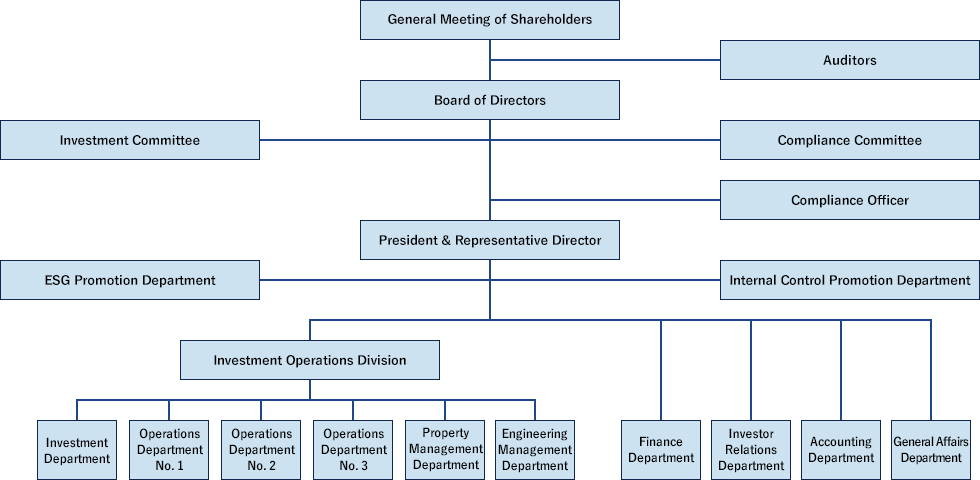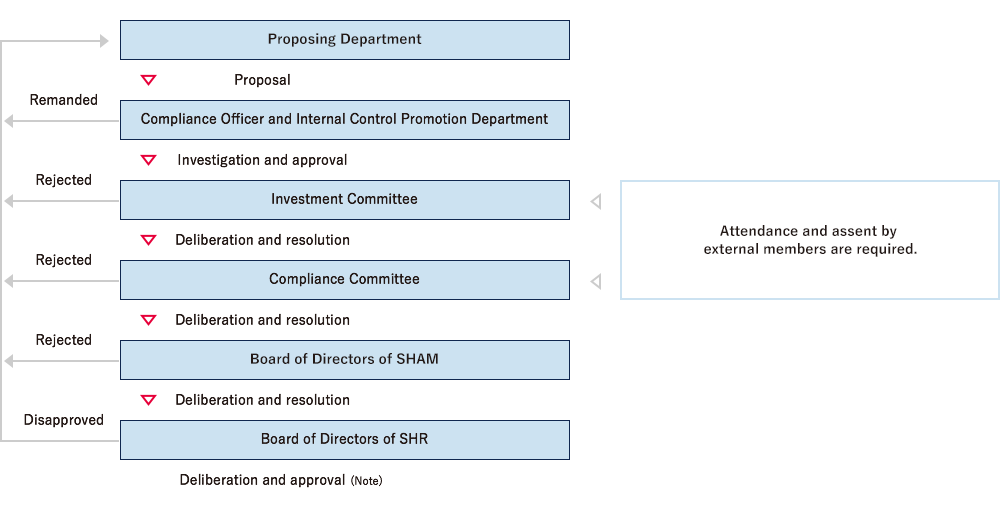Corporate Governance
SHAM, to which SHR entrusts its asset management, set the following various rules and regulations. The objective is (i) to ensure that the directors and employees of SHAM shall comply with applicable laws, regulations, various rules and the internal rules of SHAM; (ii) to establish a system for SHAM to appropriately manage investment assets and (iii) to ensure appropriate business operations by SHAM.
Compliance System
The organizational chart and administrative organs concerning compliance at SHAM are as follows.

Establishment of governance structure for ensuring objectivity regarding conflicts of interest
For the purpose of tightening examinations on transactions with interested parties, including the acquisition of portfolio assets and the entrustment of property management services, SHAM has adopted frameworks under which (i) each decision to be made by Investment Committee and Compliance Committee must be conditional upon the attendance and assent by external members appointed from among professionals who have no special interest with interested parties of the SHAM such as Sekisui House, Ltd.; and (ii) preliminary review by Compliance Officer and Internal Control Promotion Department, deliberations and resolution in respective meetings of Investment Committee and Compliance Committee, and deliberations and resolution for approval of the Board of Directors of SHAM, and consent of SHR based on deliberations and resolution of the Board of SHR are required.
An example of decision making flow

- Approval includes consent of SHR based on said approval.
Prevention measures of conflicts of interest transaction
SHAM stipulates Rules for Transactions with Interested Parties concerning transactions between the Interested Parties of SHAM and SHR as an internal rule to exclude adverse effect of conflicts of interest.
An overview of Rules for Transactions with Interested Parties is as follows:
| Acquisition of property from Interested Parties | The acquisition price (excluding taxes, cost of acquisition and others) must be no more than the amount of the appraisal value, etc. determined by a real estate appraiser who is a non-interested party appointed at the time of the acquisition. |
| Sale of property to Interested Parties | The sale price (excluding taxes, cost of transfer and others) must be no less than the amount of the appraisal value determined by a real estate appraiser who is a non-interested party appointed at the time of the sale. |
| Payment of an agency fee to Interested Parties | The amount of intermediary charge to be paid must be within the range of remuneration set forth in the Building Lots and Buildings Transaction Business Act. |
| Entrusting management, etc. of real estate and other assets to Interested Parties | Entrustment of management services, etc. for real estate and other assets must be based on conditions considered adequate upon comprehensive consideration of market levels of management consignment fees, the content of provided services, total workloads and so on. (The appropriateness of contractors is verified by independent external evaluation organizations which have no interest with SHAM once a year, in principle.) |
| Conclusion of leasing contract for real estate and other assets with Interested Parties | Lease contracts must be based on conditions considered adequate upon investigation of market rent levels and prices of similar transactions in surrounding areas, etc. and by using the opinions of third parties as a reference, who are non-interested parties, as needed. |
| Placing orders for construction work, etc. to Interested Parties
(Residential Properties: Contract amount of 5 million yen or more Commercial Properties: Contract amount of 30 million yen or more ) |
Placement of orders with interested parties must be limited to cases in which the estimated price, content of services provided, etc. are not disadvantageous to SHR upon comparison with third parties. |